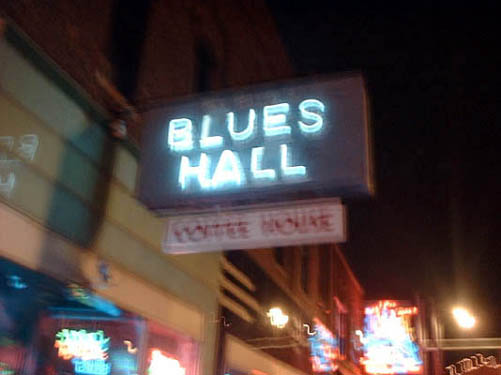I Got The Blues...

I Got The Blues... |
||||||
|
|
|
|
|
|
|
|
 |
||||||
The Blues music originally grew popular among the black population during the time when slavery was prominent in the United States. Before the origination of the blues, African American's voiced their feelings and interpersonal relationships while working out on the planatations. These were referred to as field calls, which were the blacks way of communicating with each other, in a language that their owners could not distinguish. Another means of communication was work calls, which were used by peddlers in Northern and Southern cities.
The word "blue" relates to a lot of aspects that blues music represents. "Blue" goes alongside depression or melancholia, dating back to the Elizabethan era. In 1807, Washington Irving was given credit for defining the blues for the meaning it is today.
The blues was said to have first been sung by men at leisure, and it was referred to as folk-blues. These folk blues singers sung around the community and even travelled through means of carnivals. As African-Americans began to migrate North in the early 20th century, they introduced the blues to the Northern region. During this time, there became two distinct categories of either black-butt pianists (composers from Texas, Louisiana and Arkansas) or Fast Western pianists (imitators of Southern guitarists). The two emerged together, along with country singers, and brought about a new definition of the blues music. They introduced their new style in Chicago, New York and Detroit. The music quickly grew popularity among these areas and it began to be played in clubs, dance halls and theatres. Because blues music was so popular among African Americans, they began to move into city-areas and branch away from the rural atmosphere. African Americans wanted their own places and therefore black clubs and theatres were open. Women followed the foot-steps of their men and migrated towards the city also, in hopes to be able to play their music in public places. They then began to perform in dance halls, theatres and clubs. Lawrence Levine once said," there was a direct relationship between the national ideological emphasis upon the individual, the popularity of Booker T. Washington's teachings, and the rise of the blues."
Blues music started to become available to the public in 1895 with the first recorded blues song. It was "Laughing Song" which was recorded by George W. Johnson. Although this was an important mark in the blue's history, the real recording that opened up many doors for the rising demand for this genre of music was in 1920 when Mamie Smith recorded "Crazy Blues" and "It's Right Here for You." Her record was only one dollar and it sold 75,000 copies within the first month of the recording.
At first blues music was categorized as being "black music" and it was only marketed to black clubs, theatres, ect. During this time period, from the 1920's-30's, blues music was given the stereotype of being "race records." After Mamie Smith's recording, things gradually began to change and become more diverse. Companies began to look around for talented singers, despite the color of their skin or their gender. During this time period, Bessie Smith, "Ma" Rainey and Alberta Hunter became well-known composers.
Blues singers believe that as they sing a line of their music, their guitars answers them. This still remains the case with most blues composers. In the early 1960's, the blues began to include white singers into this genre, which was something no one had been able to do for several years. More modern blues composers include: the Rolling Stones, the Yardbirds, Cream and Fleetwood Mac. Also, since the 1960's many popular artists have incorporated blues techniques into their music. Most of these include rock guitarists Eric Clapton, Jimi Hendrix and Jimmy Page.
The blues has opened many doors for other genres of music. The blues has helped contribute to the development of other genres of music including jazz, rock and country.